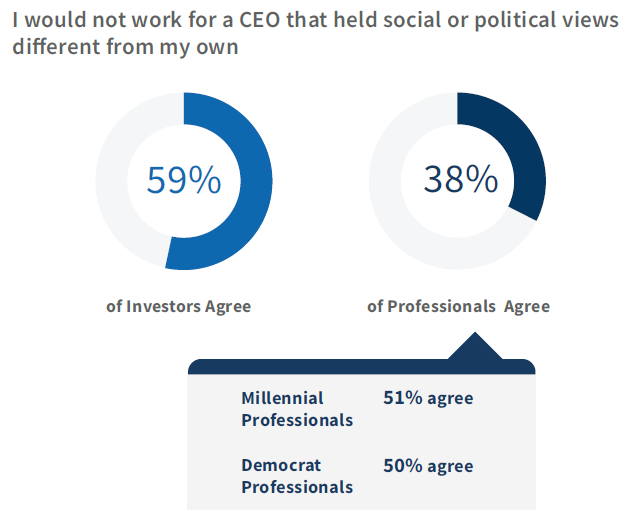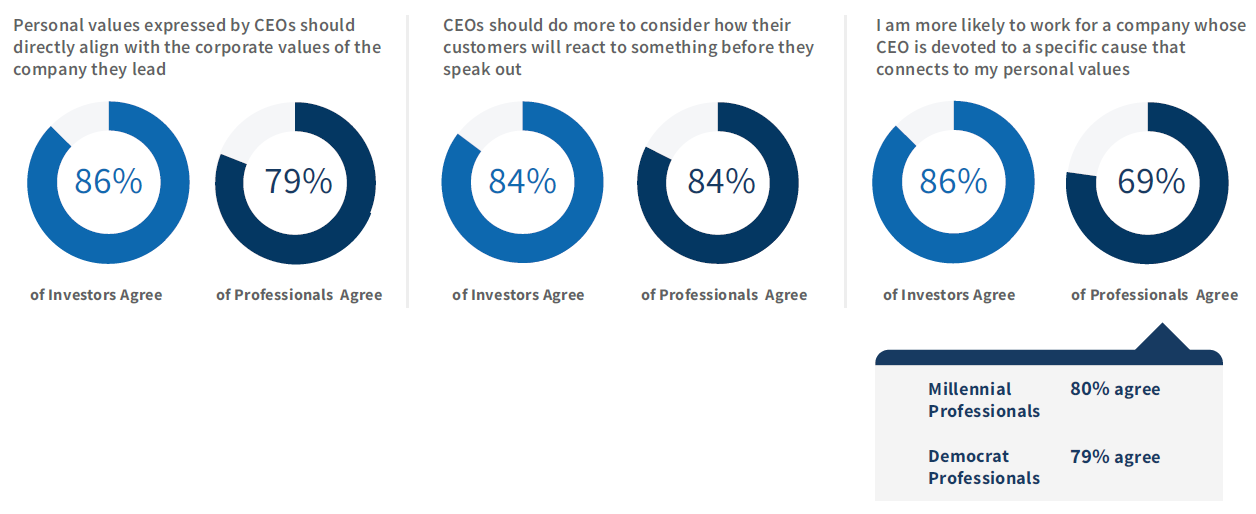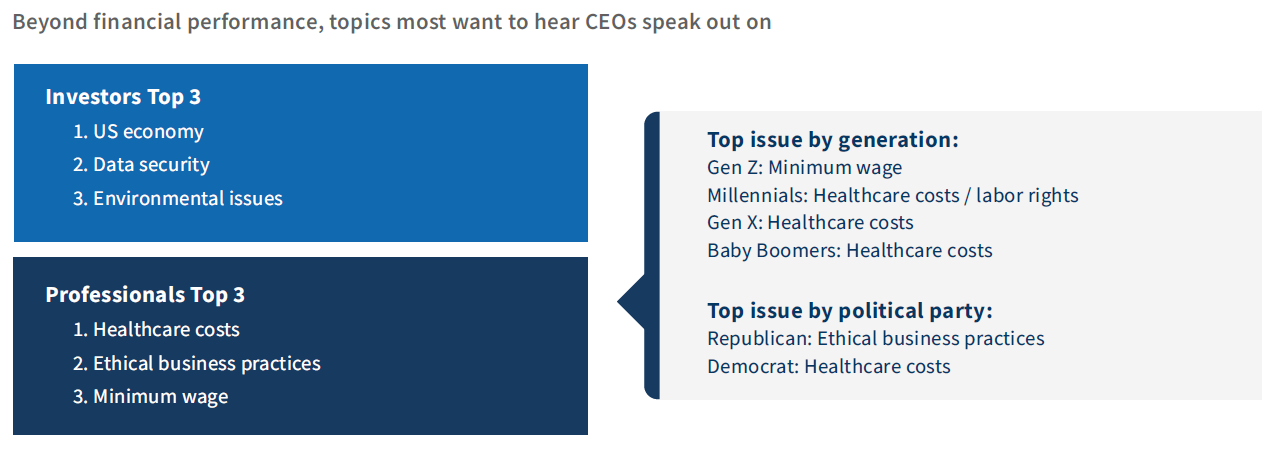Christine DiBartolo, Jackson Dunn, and Brent McGoldrick are Senior Managing Directors at FTI Consulting. This post is based on an FTI memorandum by Ms. DiBartolo, Mr. Dunn, Mr. McGoldrick, Elly DiLeonardi, Greg Mecher and Lindsay Kunkle.
Related research from the Program on Corporate Governance includes Corporate Political Speech: Who Decides? (discussed on the Forum here) by Lucian Bebchuk and Robert J. Jackson Jr.; The Untenable Case for Keeping Investors in the Dark (discussed on the Forum here) by Lucian Bebchuk, Robert J. Jackson Jr., James David Nelson, and Roberto Tallarita; and The Politics of CEOs (discussed on the Forum here) by Alma Cohen, Moshe Hazan, Roberto Tallarita, and David Weiss.
Increasingly, Americans are turning to the private sector for leadership as the boundaries between the political, social, and business arenas blur. Viewed in the best light, this is a search for value-based leadership. At worst, the forces of polarization have now crept into companies, which makes it particularly challenging for CEOs to determine how to engage on issues—particularly ones that can be seen as political—without creating new business risks.
In this post, we use our research of two of a company’s most important stakeholders—professionals and investors—to explore what CEOs must consider when wading into politics and policy discussions.
Demands on CEOs are being driven by the belief that businesses can influence the United States’ future
Investors and professionals see large businesses having real impact. In fact, they are perceived to have influence on the future of the country equal to—or even exceeding that of—federal, state and local government. This sentiment goes one step further in current times.
Investors and professionals look to businesses to partner with the government to help manage and overcome crises and major social change. CEOs are expected by stakeholders to take their responsibility to the country, not just their business, seriously.
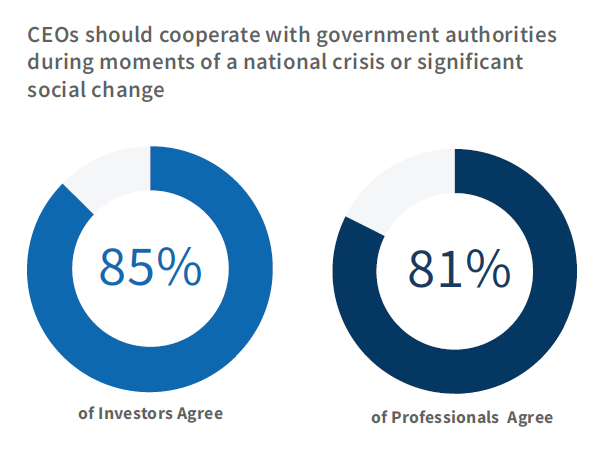
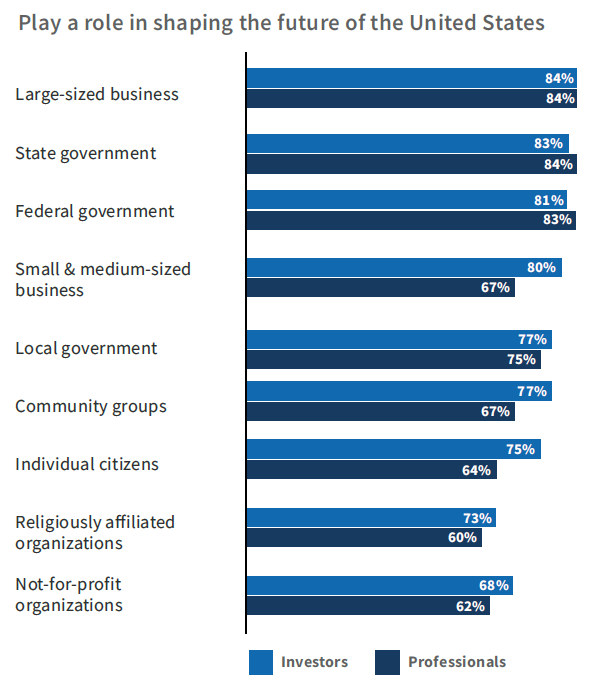
CEOs will have to navigate a rapidly evolving landscape of stakeholder pressures to respond to “hot button” issues
In the past we have seen CEOs largely avoid using the bully pulpit or even individually commenting on policy or political issues, unless it directly involved their business. With the increasing focus on corporate responsibility and the public looking to the private sector for solutions to societal challenges, CEOs have had to take on a more prominent role in these discussions. While it is true that there are issues which CEOs may choose not to comment on or address, they will certainly face greater pressures moving forward. And in today’s real-time information economy, there is no such thing as an internal statement that stays internal. Anything a CEO says, even strictly to internal audiences, may very well be shared externally.
Our CEO Leadership Redefined survey shows significant generational differences when it comes to addressing political issues, and many CEOs may not yet grasp that their under-40 employees likely expect them to address these issues head-on. Similarly, Democrats are more likely to endorse CEOs engaging in politics than Republicans are. In fact, half of both Millennials and Democrats even go as far as to say that they would not work for a CEO with different political views.
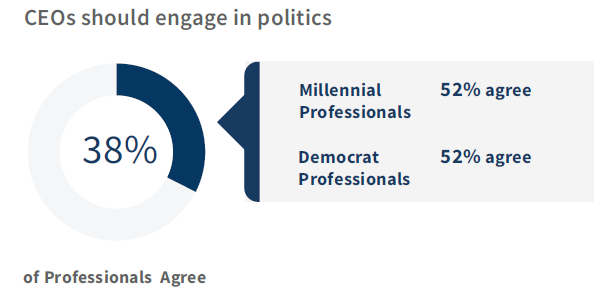
CEOs must consider the expectations of all stakeholders before speaking out on issues—with a particular focus on employees
According to investors and professionals, even the personal values CEOs express should align with those of the company overall, especially with those of employees.
America today, as with any individual business, is comprised of diverse and widely polarized opinions—politically, socially and economically. Not every message will land with every stakeholder positively or in the same way. CEOs need to be prepared to carefully consider the expectations of all stakeholders: employees, investors, customers and partners, media, public officials and politicians, and even competitors. How will they react to specific issues? What will lose their support? What are the impacts of alienating a certain stakeholder sub-group with a particular message? And perhaps most importantly, who is most important within these audiences, and what can be done to connect with them?
Generation and political affiliation along with other factors will play into stakeholder expectations of how CEOs should respond to hot button issues and events. Those businesses that proactively gain insight into their most important stakeholders will be best positioned to organically create greater internal alignment around the corporate purpose which will be amplified externally. In turn, the corporate purpose will serve as a north star guiding which issues to address, as well as which not to—no matter how sensitive or controversial.
Looking at greater societal issues of today, investors and professionals differ in where they want CEOs to speak out. With investors’ interest in financial success—not just of a single business, but of the market overall—they are especially interested in CEOs addressing the U.S. economy, data security and also environmental issues with ESG top of mind. Professionals, on the other hand, are looking for CEOs to address issues that improve employee welfare, including healthcare costs, ethical business practices and addressing the minimum wage—an issue that is especially top-of-mind for Gen Z professionals, who are just starting out in the workforce. When top issues for professionals are separated by political party affiliation, Republicans are most concerned with ethical business practices while Democrats are most concerned with healthcare costs.
CEOs need to tread carefully; stakeholders overwhelmingly agree that what a CEO says publicly about societal issues impacts their opinion of the company
When a CEO speaks, the company’s stakeholders listen and will change their opinion of the company based on what they hear. In fact, we generally see more favorable than less favorable changes in opinions when CEOs speak out on a range of issues from the pandemic to improving DE&I efforts to politics. That said, while speaking out is generally expected, it does not mean that a CEO needs to issue a statement on every event and issue, especially politically charged ones. Fewer than a half of investors and only 3 in 10 (31%) professionals have a more favorable view of CEOs as a result of them speaking out on politics since the start of the pandemic—more favorable changes than less favorable changes, yes, but largely getting a neutral response especially from professionals. Additionally, professionals’ political affiliations plays a major role in their opinion of a company based on what a CEO says publicly on societal issues. Overall, about half of Democratic professionals agree that what a CEO says significantly affects their overall opinion of a company. Republicans, on the other hand, believe public comments from a CEO matter less in forming their opinion of the company (26%).
During the last 18 months, we have seen CEOs take action on a variety of challenges facing our country and society. How has your perspective of CEOs changed based on:
 Print
Print